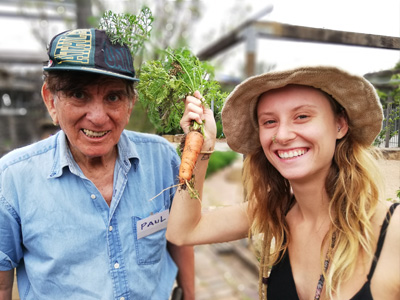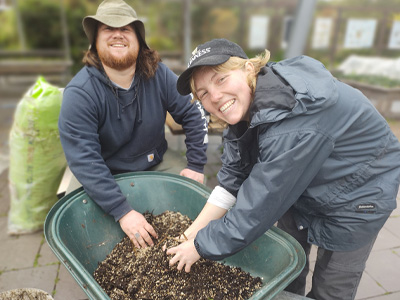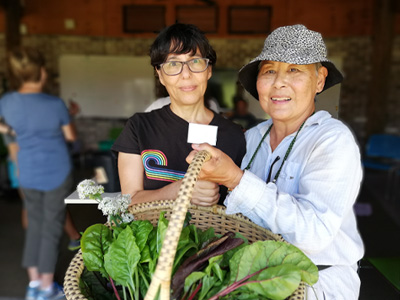Beyond the garden with PermaBee
- Published Date
- 08/11/2022
- News Topic
- Council, Sustainability & Environment

While PermaBee may seem like any other community garden, the people who make up this volunteer group are the living heart of the Sustainability Hub.
Encompassing open space, nature trails, five different demonstration gardens and a sustainable classroom, the Hub is an oasis just down the hill from Randwick’s iconic Spot. The site sees around 20,000 visitors every month including locals, school groups and businesses. The Hub has even featured in TV shows including “Old People's Home for 4 Year Olds”.
Every Friday morning, the PermaBee volunteers come together to work in and maintain the gardens, turning what was once a plain grassed area into a beautiful and productive series of educational gardens.

It may be off the main road, but the Hub and its gardens has attracted many groups and activities including the Sydney Bee Club, WIRES, Adamama, yoga, African drumming, playgroups, geocaching, orienteering, nature wellness trail, nature discovery trail, Eco Living Festival, NOX night sculpture and Twilight Concerts, with more to come. Each of these groups and activities takes advantage of the beautiful surrounds and gardens to deliver their nature-based programs to the community.
The gardens were first designed and developed around 12 years ago. In that time people have come and gone, but the strength of connection between members is palpable.
We believe there are a few things that help the group to function smoothly and avoid some of the conflicts that can occur in typical community gardens. Facilitators work with the group and create a consistent vision, so members can learn from experts and develop their own skills more quickly. All gardens are communal, so everyone is working together for the common good. And, of course, we share morning tea, which has become an opportunity for members to share unique foods and celebrate important events from their culture.
PermaBee volunteers come together like a second family, and spend time together both inside and outside of the garden. Members organise visits to each other’s gardens, go on field trips together, and even help look after each other’s pets.

To keep the group connected during Covid lockdowns, a Whatsapp group was created, and is still used now that we are back in the garden. In fact, it’s busier than ever and full of conversation about individual’s gardens, achievements, recipes and opportunities to learn more. Open to all, it helps keep the group connected throughout the week and makes organising activities easy. It keeps present and past members connected, and helps us to reflect on what we have achieved.
Not only do the PermaBees make the Randwick Sustainability Hub shine, but their impact can be felt throughout the community. The strong connections that the PermaBees have built allows them to support each other to take their skills and experience out of the garden and into the community by organising initiatives for each other and the wider community.
PermaBee has been a supportive place to start new ventures and we are proud to have nurtured initiatives such as TED Circles in Randwick, which brings community together to talk about climate change in a friendly and informative way, and Organic Buyers Group, which makes organic produce accessible at non-organic prices. Our current project is a sustainability themed library.
The importance of having supportive people you can trust and a space to develop new initiatives can not be underestimated. Ask anybody involved in social and environmental change, and I’m sure you will receive emphatic nods that they could not have turned their idea into reality without good people to do it.
PermaBee is a local community garden which you may not have heard of until now, but it’s impact can be felt across the community.
PermaBee and the Randwick Sustainability Hub is open to anybody in the community. For more information and bookings visit the PermaBee section on Council's website.
